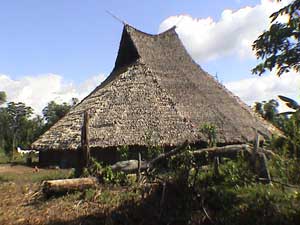
Regularly going to the Colombian Amazon since 1997, I have dedicated myself to the transcription, translation and study of oral literature of the Yucuna and Tanimuca Indians, whose respective languages are classified as definitely endangered and severely endangered by UNESCO. These languages are different because they respectively belong to the Arawakan and Tucanoan language families, but many of these Indians speak both languages because of their exogamous affinal relationships. Their cultures are quite similar, despite their linguistic differences; many dances, ritual practices, worldviews and mythological references are similar or shared.
This site aims to make the materials and documents (corpus of narrations, conversations, chants, etc.) that I have been able to develop with the Yucuna and Tanimuca Indians available to the public, in order to better introduce, describe and get to understand their languages and cultures.
I received my PhD in anthropology in 2001 and my Habilitation à Diriger des Recherches (HDR) in 2015 from the Université Sorbonne Nouvelle - Paris 3. I am an affiliated member of the LACITO (Languages and Cultures of Oral Tradition), a multidisciplinary research laboratory of the CNRS (French National Centre for Scientific Research) since 2001 and a Director of Research at the Université Sorbonne Nouvelle - Paris 3 since 2016.
I have published books and articles about the ethnology and ethnolinguistic of the Yucuna Indians. After having particularly worked on the mythology of the latter, I have also been interested in their shamanism and incantations since 2007. In parallel, I have been studying the culture and language of Tanimuca since 2002.
My PhD thesis was about the rules of gifts and exchanges which are implicitly and explicitly used in every forms of speech (Mythology, Conversations and Ceremonial dialogues) of the Yucuna. Developing a corpus of transcription of the Indian's speech acts collected in different situations, I have analyzed it to distinguish Yucuna's institutions (kinship, shamanism and ceremonial residence of roundhouse) with White's institutions.
I used the deontic logic of Von Wright to formalize the analysis of the Social System, to study its historical transformations and to compare it with other societies or cultures. Now I study the yucuna incantations and ritual songs, and I am developing some corpus of mythology and incantations from the Tanimuca.
My resume in english (reduced version)
My web page on the LACITO-CNRS's website
My iNaturalist project (to identify the species of plants and animals known by Yucuna and Tanimuca Indians)
![]() Localization of the Yucuna-speaking Indians : The Yucuna (or Kamejeya), the Matapí (Jupichiya), the Je'rúriwa, the Jimíke'pi and the Jurumi
Localization of the Yucuna-speaking Indians : The Yucuna (or Kamejeya), the Matapí (Jupichiya), the Je'rúriwa, the Jimíke'pi and the Jurumi
![]() Localisation of the Tanimuca-speaking Indians : The Tanimuca (or Ũ’páirã) and the Letuama (Rétuarã)
Localisation of the Tanimuca-speaking Indians : The Tanimuca (or Ũ’páirã) and the Letuama (Rétuarã)

Mario Matapi's Rounhouse (maloca),
La Pedrera, Camaritagua, 2003/07